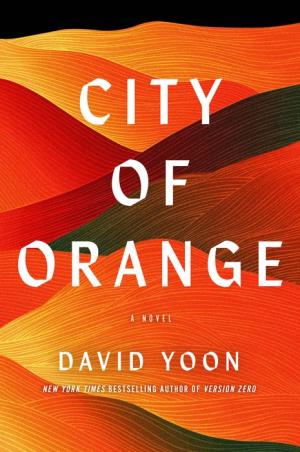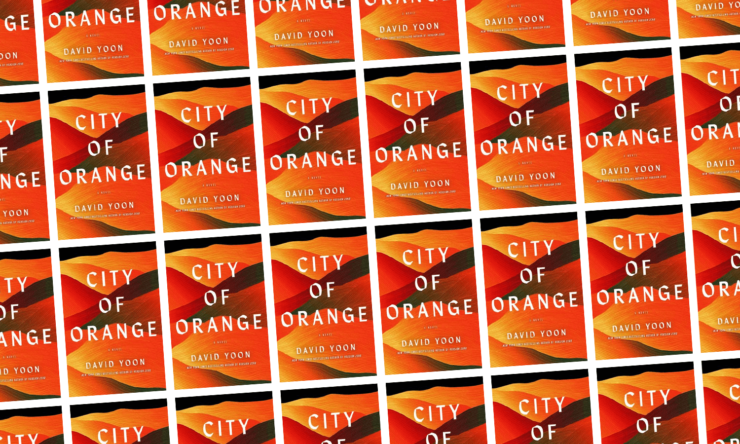I’ve become weirdly allergic to the post-apocalyptic novel in our year of 2022. Can you blame me? With the climate crisis on our heels and Elon Musk allegedly buying Twitter; The Handmaid’s Tale cosplay at the protest and a conservative resurgence eating away at a gamut of civil rights, our collective sense of doom is basically quotidian. The goal of dystopic fiction has always been to amplify and make strange the problematics of our world, but these days, it’s far more difficult for the acerbic, surreal quality of writing like Ling Ma’s masterpiece Severance to hit. Especially when it seems it’s almost every other day that I’m texting a friend about the news like, ‘you can’t make this shit up.’
Let’s admit it. Perhaps the gap between our fantasies of the end of the world and current reality has simply become too narrow for the practice of reading post-apocalyptic fiction to be… entirely comfortable.
But enter David Yoon’s City of Orange, a book that takes on exactly this End-Times issue of being unable to tell the imagined from the truth. Its tantalizing premise: what if you found yourself stranded in the post-apocalypse with no memory of how things were before? All alone—with the rest of humanity obliterated and no access to any history, cultural or social reference points. Would it be possible to discern what’s real from what’s not as events unfold, absurd, all around you?
This is only the first of the dilemmas that Yoon’s protagonist must face when he wakes with amnesia—sore from a head injury and in the possession of a bottle of unidentified pills. The landscape he finds himself in is hot and dry, as dreamlike as it is concrete. Water is scarce, other people even more so. He’s able to scrounge up some stray knowledge about what ‘desertification’ entails, but the expanse of his personal history remains blank, absent. He can’t remember his own name, but his urge to ascertain the wellbeing of a wife and child tugs, panicked, at his chest. Also, he has to figure out how not to die.
Yoon is painstaking in his depiction of his protagonist’s initial bewilderment. The novel is a play-by-play of his every minute action, thought and emotion in prose that’s conversationally direct; lyrically unfiltered without feeling too heavy or dramatic. As he fumbles to piece together what happened to the rest of humankind, we’re sunk into the dregs of a disjointed, patchworked consciousness that’s equal parts funny and philosophical. There’s macabre humor in how he remembers money as “the stuff you bought shoes with. He’d never had enough of it.” There’s urgent terror in his realization that a wine opener, capable of leaching water from a rusty faucet is as crucial as primordial “fire in [his] hand.” And there’s unexpected profundity too, in the dehydrated, delirious logic that leads him to talk to a dead crow about the fundamental good or evil of humanity.
Buy the Book


City of Orange
City of Orange is less a panoramic view of a post-apocalyptic landscape, rendered via traditional techniques of worldbuilding, than it is an intimate portrait of one man’s mind. A funhouse reflection of how it feels to travel through the warped corridors and mazed processes of residual trauma, memory loss and re-formation. It’s exactly this meandering quality that allows Yoon to deviate from the usual suspenseful question, ‘will [main character] survive the apocalypse?’ in favor of asking something more troubling and potent.
If given the choice, he asks, would we want to “survive our own forgetting “?
Spoilers follow
More interesting than the adverse conditions with which the protagonist reckons is his experience of amnesia, which Yoon renders via short fragments that suggest the boundaries between hallucination and recollection are permeable, fragile. And as the protagonist’s memory starts to return slowly to him, flashes of his wife and daughter intrude into the narrative, scattered amidst his laborious attempts to fashion a spear or open a can of soup. He remembers his name is Adam. Slightly hysterically, he discusses the responsibility of being the last remaining member of the human race with his best friend from the past, Byron, who obviously isn’t actually there.
In the fluctuating architecture Yoon creates out of Adam’s mind, it’s difficult to tell what’s material from what’s symbolic. Familiar scenarios and details from his life before—movies and toys and diapers—bleed restlessly into the practical demands of the wasteland; take on the hazy quality of dreams. It’s a fascinating ambiguity for the reader. Are the crows that keep showing up a source or food or some kind of portent? Is the older man who wanders into view and laden with plastic bags, just another desperate survivor, or a hologram of Adam’s future self?
Because nothing is remembered, everything is possible. “Everywhere in the world has its particular patterns and those patterns make up the fact of the place,” Adam muses. Meaning: without the guidelines and conventions that structure a society, that produce hierarchies and outcomes in the fashion that he’s used to, it becomes difficult for Adam to know who he is, how he should act, or what he can predict. When Adam realizes he is Korean, “he examines this mental artifact for clues. It gives him nothing.” Indeed, the most essential elements that supposedly make up his being start to seem, to some degree, illusory—“we gave up the real world of things a long time ago.” So, to what extent are the engines that drive our world—late capitalism or categorizations of identity—in fact, arbitrary?
There are a number of interesting theoretical propositions that emerge in City of Orange—about the place of individuals as civilizations come and go; how memories mean a person can exceed their death; about how ethics play out differently when survival is at stake. But these are left mostly as transient thoughts, free-floating and unresolved. What Yoon does dig deeper into, however, is the notion that meaning cannot be ascribed alone, only socially, between people. It’s no coincidence that Adam’s memories slot quicker into place after interacting with the old man who wanders into his space, and more significantly, with Clay, a young boy he meets who’s clean, likes video games, and seems entirely unimpacted by the post-apocalypse.
Clay is not only a source of information but a projective focus for Adam, a point from which he starts working in earnest to reconstruct his life. Clay is a “multitemporal actor” who could be Adam’s past self, who in an alternate reality could be his daughter’s “future best friend,” or could make for an adopted son in this one. Ultimately, it’s the tenuous intimacy of building this relationship that helps Adam come to terms with his past—the loss of his wife and child in a terrible car accident, how he came to be injured in the first place. It’s the mutual recognition and stilted care that Clay and Adam offer each other; how the details of their lives take shape despite the arid space stretching between them, that brings emotional force to the book’s last unexpected twist. (I shan’t spoil it here!)
Rather than expand fully into the potential of dystopian fiction, Yoon narrows our vision of post-apocalypse into a searing lens through which we gain new perspectives on fundamental human values of love, grief, and regret. And although there were moments I felt that City of Orange inhabited a sentimental middle space—not surreal enough to be productively peculiar, nor narratively capacious enough to pry open the existential or societal critiques I desire from post-apocalyptic fiction, perhaps therein lies its strength.
In Chris Marker’s found-footage film Sans Soleil (1983), there’s a striking moment of voiceover—“we don’t remember,” he says, “we rewrite memory as much as history is rewritten.” Perhaps, through Adam’s forgetting, City of Orange reminds us that the apocalypse is not a real or imagined event to come, but something malleable, ongoing. Something as interior as it is external. And more important than how we plan to survive the apocalypse or concede to it, is the question of how we perceive it and all that’s led us to it—that by choosing to re-remember differently or together, our collective sense of possibility can shift. Maybe even enough for us to change our future.
City of Orange is published by G.P. Putnam’s Sons.
Trisha Low is the author of The Compleat Purge (Kenning Editions, 2013) and Socialist Realism (Emily Books, 2019). She lives in the East Bay of California.










